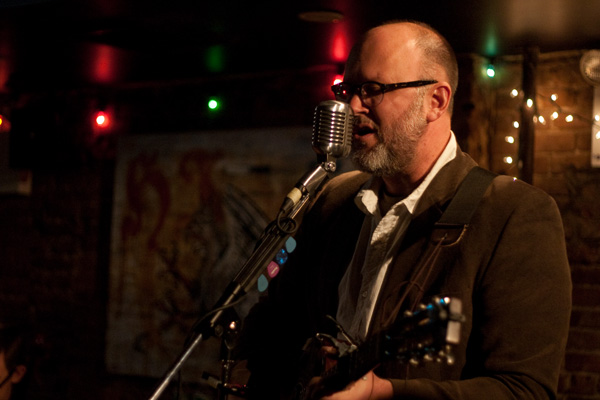As I’m sure is the case with many people, there are albums whose songs have become so intertwined with my memories from a specific moment in time that just hearing them can conjure a flood of images and emotions. Such is the case with the first two albums by Eric Bachmann’s Crooked Fingers project. Much of their resonance has to do with the fact that I first experienced them live. Even though I never cared much for Bachmann’s previous work with the Archers of Loaf, at a friend’s insistence, I ventured out on a cold Ohio night to see Crooked Fingers. The show was sparsely attended, but that only meant that we drank whiskey with Eric during the opener’s set. Even being a sheet or two (or three) to the wind, I can still remember being floored by Crooked Fingers’ set of originals and choice covers like Prince’s “When You Were Mind,” which they played from the floor instead of onstage.
In the months that followed, the album for which Bachmann and company were touring, Bring on the Snakes, along with its self-titled predecessor, rarely left my stereo and they became the drinking soundtrack to a tumultuous few months. Bachmann and Crooked Fingers subsequently went on to release several equally powerful records, but for me Crooked Fingers and Snakes remain souvenirs from an amazing live experience and my own fraught past.
This past week, Bachmann played the first of two shows where he would be performing Crooked Fingers and Snakes—both recently reissued on vinyl for the first time by Merge Records—in their entirety. But what also marked this occasion (and the one in Durham two days later) was that this was the last time Bachmann would be performing under the Crooked Fingers moniker. He’s putting the band aside to continue under his own name, with a new solo album out next month.
What also made this reminiscently chilly night special was the locale. This was one of the infrequent nights of live music at HiFi, the bar that was once the home of Brownies, a legendary club and one of my favorites. With the bar no longer arranged optimally for live performances, capacity was at less than 100 for the sold-out show, making it decidedly intimate.
Accompanied by a violinist and cellist, Bachmann began in reverse chronological order, playing Snakes first. Even with the minimal backing of just the strings and Bachmann’s own acoustic guitar, the song’s swarthy hues were as stirring as ever, and the audience was soon brought to rapt attention. With each successive song Bachmann’s ruddy voice grew warmer, and tracks like the bluegrass-flecked “Surrender Is Treason” and the album’s parabolic title track also highlighted his finger-picking. The record’s themes of good, evil, and redemption came to a head with the baptismal imagery of “There’s a Blue Light” and Bachmann sang it with a resolve perhaps not present in the original recording.
Before beginning the self-titled album—or “the swan album,” as its often called—he previewed his forthcoming record with “Carolina,” a track written by his wife Liz Durett, who also plays on the album, and which blended seamlessly with what we had just heard. “Crowned in Chrome,” of course, began the second set, but it was the subsequent “New Drink for the Old Drunk” that elicited the greatest response from the attentive audience, who joined in on the choruses. It’s a favorite for good reason, a blend of drinking song musical motifs juxtaposed with lyrical empathy. Indeed, one of these records’ greatest assets is Bachmann’s ability to take archetypal Americana and bend it to his own unique perspective, creating songs that feel at once universal and personal.
He explained another of the record’s many highlights, “She Spread Her Legs and Flew Away,” as the opposite of ZZ Top’s “Legs” before playing the touching and elegiac song. But it was the album’s natural apex, the closing “A Little Bleeding,” that of course brought the performance to its climax and pulled up vivid memories of first hearing its rapturous refrains. Bachmann exited the stage briefly before returning to a barrage of requests. He opted to play Achers’ “White Trash Heroes,” which seemed like the hangover after the night out by comparison, but also revealed the continuity of his work, a thread that will no doubt continue to wind through everything he does in the future under his own name.


Your Comments